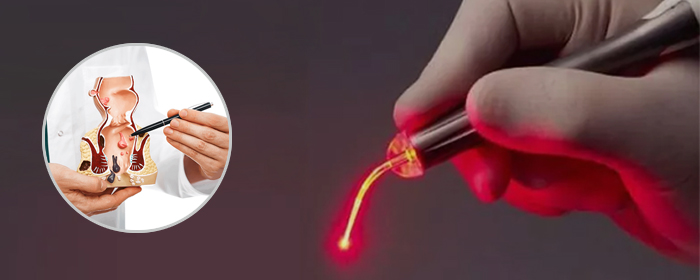Services
Laser Piles

Laser Piles is a surgical procedure in which a laser beam is used to shrink the Haemorrhoids, which are swollen and enlarged blood vessels located in the anal region. It is also known as Laser Haemorrhoidectomy or Haemorrhoidal LASER Procedure. Laser Surgery for Piles is usually a daycare procedure where the patient can be discharged within 24 hours. The recovery after the surgery is generally quick and effortless.
Pile or haemorrhoids are swollen and enlarged blood vessels in the anal cushion region that can cause discomforts like itching and rectal bleeding. Based on the location of the development, piles are of two types:
Internal haemorrhoid: is present inside the anus.
External haemorrhoid: is present under the skin around the anus.
Who needs Laser Piles Surgery?
Laser piles surgery is performed in adults to remove the haemorrhoidal tissue or disrupt the blood vessels inside the haemorrhoids. Haemorrhoids are classified into four different grades or degrees:
Grade I or First-Degree Piles: Haemorrhoids that are not visible from the outside. They might occasionally bleed due to excessive straining or friction.
Grade II or Second-Degree Piles: Haemorrhoids that come out of the anus due to exertion or while passing stools but go back inside by themselves.
Grade III or Third-Degree Piles: Haemorrhoids that come out of the anus due to exertion or while passing stools must be pushed back manually or take time to return.
Grade IV or Fourth-Degree Piles: Haemorrhoids that stay outside of the anus and cannot be manually pushed back inside the anus. Grade IV piles may sometimes lead to trauma, ulceration and increased bleeding.
The doctor will decide the treatment for piles based on the severity of the condition and prolapsed haemorrhoids. For example, they may opt for laser surgery for multiple small internal and large internal haemorrhoids.
Benefits of Laser Piles Surgery
Laser surgery for piles is quite popular nowadays because of the following benefits:
Lesser pain than any other surgical procedures
No need for a hospital stay
Safer treatment option
Lesser bleeding during the procedure
Quicker healing
Shorter recovery period
No cuts, open wounds, or sutures
Quicker return to regular activities
Shorter duration to complete the procedure
Higher success rate
Fewer follow-up visits
Lower risk of recurrence
No or minimal risk of post-surgical infections
Risks and complications of Laser Piles Surgery
Laser piles surgery is minimally invasive has a quick recovery rate and has various other advantages. However, there may be some risks of the surgery that a patient may experience while undergoing the procedure. Following are some of the risks and complications of laser piles surgery:
Pain
Bruising
Swelling in the treated area
Difficulty in passing bowel after the surgery
When is consultation with the doctor needed?
The patient must consult the doctor when:
Pain or bleeding is severe
Experience unexpected drainage or pus coming from the rectum
Trouble in urination or bowel movement
Symptoms of infection, such as fever
Risks of delayed Laser Piles Surgery
If piles are not treated in time, they can be uncomfortable and may affect daily activities. Risks of delayed laser piles surgery may include:
Extreme burning pain while sitting
Bleeding in stool
Prolapsed haemorrhoids
Infection